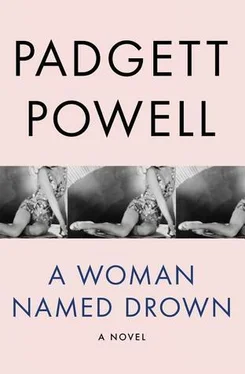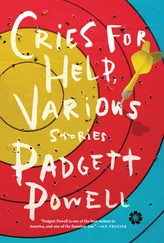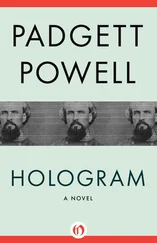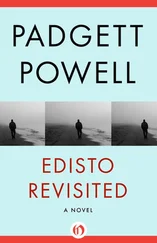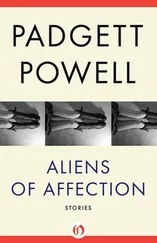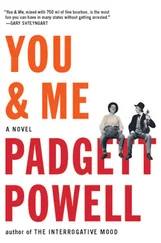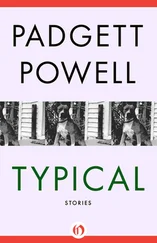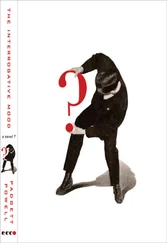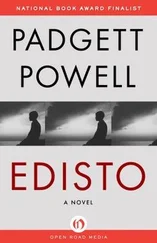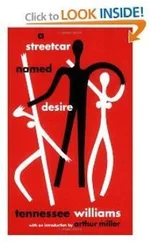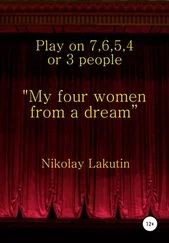And you've lost your marbles, I squeeze back to him; I know, look how few you gave me.
We grin, not at each other but at the floor, departing from salesman's form.
While the notion of marbles is afoot, I look around for my mother. "She's not down yet," my father says.
He hands me a beer and we sit.
"What's going on?"
"Nothing."
This is code: Are you still wasting your life? Yes. The silent ghost that is my mother appears at the foot of the stairs, extending around the doorjamb a preposterously tall, narrow glass that suggests a flared vase. My father looks at the glass and waits, as I'm sure he would not do in my absence, for her to explain herself. Even though the glass is empty, she has trouble balancing it, because she holds it at the narrow base, the only place her tiny, bony hand can grip it. It leads her, like an animal going for drink, into the kitchen.
"More juice?" she says.
"I think you've had enough."
"He's so handsome," she says, about me, whom she has recognized only partly: I am her handsome son, she knows, but I am not yet her son come to visit.
"I thought, just another," she says. "Since. ."
Here she has begun to recognize my visit: since my handsome son has come to see me. She now sits and pats the chair next to her, where I go and sit. She holds my face as I take her glass. "He's so handsome." We kiss, which is perhaps the most difficult aspect of a home visit, because since her trouble began she has applied lipstick around, not on, her lips, in a wide ovoid tour of her face suggestive all at once of Emmett Kelly and blackface minstrels and topographical contour maps. She has gone in for odd shades of orange lipstick since this novel application began; it gives her the look of an aging peach.
"Maybe some of the high stuff, too," she says to my father, who is filling her vase with orange juice. He hesitates. He looks at me, as if to say he is a better keeper than giving her another drink would suggest, and I give him a little why not shrug, to suggest I know he's a better keeper, and so we agree on her drinking and he adds some vodka. Frankly I have never seen why she shouldn't have all she wants; it only changes her physical dexterity, and that not much. I do not even know the official diagnosis, though I know there is one. My father maintains simply that she is "sick." "Premature senility" seemed to suffice in the beginning, but today I am sure there are more specific names, if not more specific treatment.
She sits back with her foot-high drink, the only glass she will have, and my father and I let her concentrate on it before we start our tape.
"How's school?"
"Fine. I'm not in it, though, exactly."
"What do you mean?"
"I got fed up."
He hands me another beer. I hand it back. "I'm in training."
"For what?"
"Life."
"Good luck."
Now that I have indicated I may not become a professor, the only natural end, in his mind, of a higher degree, he is ready to allow some merit accrue to the profession which was altogether lacking while he thought me pursuing it.
"In the Depression, professors were the only guys with work. They had good jobs."
"I'm sure." We are close to the end and best part of the tape, and I can't stand it, so I jump his lines.
"Life is fifty-one percent, like you say."
"You're damned straight? His emphasis delivers the meaning: again, he means I am not straight.
Generally these conversations-or this conversation, it does not vary-amount to a slow but surefooted indictment of whatever I am doing, and they are a bit irritating because before now I have always been more or less applying myself in ways more or less indicated, I felt, by a natural pursuit of self-aggrandizing going up in the world. But tonight, for the first time, his accusations are correct, though he doesn't know it, and because they are correct, our little play is not irritating.
"What I've been doing," I say, "-and I will have that beer-is women in squalid quarters who are all about Mom's age. Been fun." My father apparently senses an extraordinary turn, which a taunt like my revelation finally is, and surprises my mother with yet another towering drink, which she bites down on like a snake volunteering venom into a toxin funnel.
"Mmm," she says. "High stuff, too."
He shakes his head with a small laugh, and he realizes we are not going to fight because I'm not going to defend, I'm going to attack.
"Fifty-one percent, I think, is better at about nineteen. I'm playing nineteen. I have a friend up the road chasing armadillos with a Geiger counter. He's hitting ninety-five percent."
My father compresses his lips, pushes them out a bit. This speech is about his credo-the speculator's hustler's credo-of life and business. If you win fifty-one percent, you're in the black. The presence of the credo is the subterranean suggestion, ever present, that I take over the oil-pipe business.
"He's so handsome." We look at her, at each other.
"You're right," he says-to me, about Tom's ninety-five percent, not my looks. He is not sincere.
While my mother balances her drink-how she came to be served exclusively in this ridiculous and difficult container I do not know-my father and I make a drink for ourselves. The strong whiskey makes me dizzy, as if a wave of water has gone through the room. I am prepared, as at no time before, to deny completely all injunction, pressure to assume the family business, which topic is just beneath the surface of all our percent patter.
Before, my refusal has been vague, I have managed simply to delay the event. Tonight I am possessed of this confident, sliding-away strength, and I am not going to delay, to put it off, I'm going to deny the inheritance because. . because I no longer trust women my age. That is the thought that comes to me as we watch my mother totter her vase of high stuff to her orange face. Pine-Sol and Havana Carlisle's legendary cigars (my father has lit a cigarillo) come to me. The entire life reaction series of human bondings and splittings has had something to do with my not taking the family business. It is the artificial center someone would have me assume.
At that moment I thought of Mary and Wallace, and of my own mother and how she had changed from someone not like them to someone very much like them. I've liked my mother a whole lot more since she became daft, for where she is dotty and funny now, she was presumptuous and full of conviction before, and if one's preferring a crippled mental state to the normal precedent, particularly his own mother's, is perverse, then so be it. It is just another index of the magnitude of the effects of the series.
I get ready to tell my father, "I refuse the business because I refuse these young twit broads full of purpose"-something actually that rational is on my tongue-when my mother says, out of the blue, to him,
"You'd better get ready."
It startles me. Can she know? Can she perceive mental states now that hers is largely gone?
"The beauty parlor isn't open until 9:30," my father says.
"Then we'd better be ready."
My mother has an appointment at her beauty parlor every day of the week. They oblige her there, with, among other services, the application of her lipstick as she likes it, and when she emerges looking like Emmett Kelly with a blue Virginia Graham hairdo, they assure her how good she looks in condescending tones.
"We'll be ready," I say.
"Do you," she says, turning to me, "have a license to meddle?"
This is a bit of the old girl. These vodkas are having a restorative effect.
"Yes," I say.
"It's expired ," she says. To my father; "Your son's got a meddling license." She means, I think, to emphasize the your , to saddle him with me, but in missing the emphasis she indicts my sex, she invokes the daughter she never was able to have, and so you cannot know finally if the emphasis is misplaced or simply badly timed. She does this curious emphasis often.
Читать дальше
